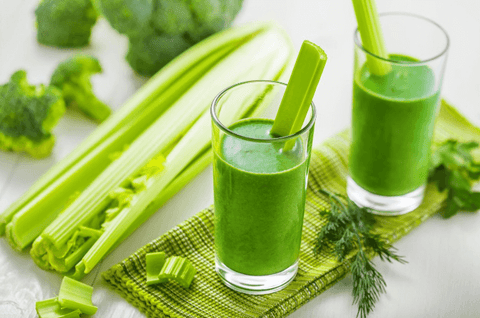A plant-based diet can help maximize your cognitive potential.
If you’re finding yourself waking up with that morning grogginess, having a hard time concentrating on your work meeting, or finding dinner from two nights ago sitting in the oven––you’re not alone. We’re all experiencing stress and anxiety from the prolonged coronavirus pandemic that is influencing our ability to focus and get things done, making our brain less sharp than it used to be.
The good news is that boosting your brainpower is simpler than you think––it doesn’t involve a daily dose of brain games, or popping pills. If you want to recoup your sharpness and regain your mental clarity, a plant-based diet is the key to working smarter and maximizing your cognitive potential.
How Does Diet Impact Our Brain?
A growing body of research shows that what we eat impacts our brain’s ability to function. “Day after day, the foods we eat are broken down into nutrients, taken up into the bloodstream, and carried up into the brain. Once there, they replenish depleted storage, activate cellular reactions, and finally, become the very fabric of our brains,” Dr. Lisa Mosconi, Ph.D., neuroscientist and author of Brain Food: The Surprising Science of Eating for Cognitive Power tells LIVEKINDLY.
However, not everything we eat is welcomed by our brain. This efficient organ already makes some of the nutrients it requires, like cholesterol, according to Harvard Health. The other nutrients? Well, they come directly from what you consume. “The brain is protected by the blood-brain barrier, which contains ‘receptors’ or gates that only allow specific and highly selected nutrients to get inside the brain,” says Dr. Mosconi. She adds that the nutrients allowed inside the brain are called “brain-essential nutrients,” which include polyunsaturated fats like omega-3s, vitamins, and minerals.
Harmful toxins and compounds can damage your blood-brain barrier, resulting in brain inflammation, suggests a 2019 report in Brain: A Journal of Neurology. Inflammation in the brain is linked to cognitive decline and neurological disorders such as Alzheimer’s disease and dementia, the study notes.
“While we do not know for certain what causes brain fog, studies show that it is linked to excessive brain inflammation,” says Dr. Uma Naidoo, M.D. She’s a nutritional psychiatrist and the author of This Is Your Brain on Food, who regularly counsels people on how to incorporate nutritional habits to improve mental well-being. She tells LIVEKINDLY: “Certain nutritious foods promote brain health by protecting neurons from inflammation.”
The Best Plant-Based Foods For Your Brain
Many brain-essential nutrients can be found in whole foods, which are unprocessed and derived mostly from plant sources. These foods high in brain-essential nutrients are called “brain foods” and do not contain harmful fats or sugars that can damage your brain.
A 2021 report published in Nature Medicine gathered information from over 1,100 participants in the U.K. and the U.S., showcasing that the quality of food—whether it is processed or unprocessed—and the source of food—animal or plant—both matter when it comes to microbiome composition.
“Studies have shown how gut bacteria in the microbiome impacts mental function. An unhealthy gut microbiome leads to an unhealthy brain and vice versa. The power of brain food can reset your microbiome and steer you back to a healthy mental state,” says Dr. Naidoo.
If you’re looking to increase your mental sharpness, here are seven plant-based foods that can optimize your brain health to get there.

Leafy greens can improve memory
Green, leafy vegetables like spinach, kale, and swiss chard do wonders to your brain, according to a 2018 study published in Neurology. The study found that just one serving of greens per day can delay cognitive decline. These veggies are power-packed with nutrients such as folate, vitamin K, and beta carotene, which are all linked to greater memory and thinking skills.
Just one serving of raw spinach contains 121 percent of the daily value of vitamin K, which is linked to a lower risk of cognitive disorders, suggests a 2015 study published in Nutrients. Add leafy greens to your salad or smoothie for a hearty, brain-boosting meal.
Seeds help protect against cognitive decline
Chia, flax, and hemp seeds are some of the most nutritious sources of omega-3 fatty acids. “Many studies have shown that consuming enough omega-3’s is protective against cognitive decline. People who consume approximately 6 grams per day have up to 70 percent lower risk of dementia in late life,” says Dr. Mosconi.
Flax seeds are one of the highest plant-based food sources of omega-3s, with just one ounce containing 405 percent of the adequate value. Seeds are very versatile and can be enjoyed with any meal, like a topping on your favorite oatmeal or mixed in a green salad.

Spices help you improve your attention and focus
“Sage, turmeric, pepper, cinnamon, saffron, rosemary, ginger, and many other spices have been shown to enhance memory. This is due to their antioxidant and anti-inflammatory properties that can improve cognitive function,” says Dr. Naidoo. One review published in 2016 in Drugs in R&D found that sage can increase feelings of alertness and increase acetylcholine, a neurotransmitter instrumental for memory.
Another review published 2019 in Exploratory Research and Hypothesis in Medicine analyzed studies on curcumin, a key ingredient in turmeric, and found links to improved attention, focus, and memory. Combine flavorful spices rich in brain-essential nutrients to not only satisfy your mind, but also your taste buds.
Cacao improves your memory and information processing
Cacao is a plant that produces cocoa beans, which are processed to create a popular treat: chocolate. Cocoa-derived products can help you think better, process information faster, and strengthen your memory, according to a 2017 report in Frontiers in Nutrition.
Cacao is filled with flavanols, antioxidants that have anti-inflammatory properties and improve cognitive functioning. “To fully experience the brain health benefits key is to get chocolate with a cacao content of 80 percent or higher,” says Dr. Mosconi. The less processed the cacao, the more brain-boosting nutrients it will contain, she adds. Embrace chocolate high in cacao content and low in sugar for a decadent hot chocolate drink or an energizing snack.

Berries aid attention and memory
Strawberries, blueberries, and raspberries are high in antioxidants and fiber, both of which can make you feel energized. A 2015 study published in Nutrition tested school-aged children’s cognitive performance after they drank a blueberry drink or placebo.
Children who drank the blueberry drink improved their attention and memory in a list-learning task compared to children who took the placebo. Berries can also fight inflammation in the brain as they contain polyphenols, an organic compound found in certain plant-based foods. Choose from a variety of power-packed berry varieties, which are a great complement to any meal.
Soy can provide vitamin B, which helps brain function
“Soy products are the richest source of isoflavones in the human diet. Isoflavones are part of a plant-based that mimics the human hormone estrogen,” says Dr. Naidoo. A 2019 report published in Nutrition Reviews found that soy isoflavones were linked to improved cognitive function. Some soy products, like soybeans, contain thiamine––also known as vitamin B.
Thiamine deficiency is linked with neurodegenerative diseases, like Alzeihmer’s or Parkinson’s. One serving of tofu contains 0.4 mg of thiamine, which is 33 percent of the recommended daily intake.
Choose from a diverse array of soy foods like soybeans, miso, fermented tofu, and soy sauce. However, beware of processed soy—which is found in many vegan meats, energy bars, and even baked goods—as they are filled with pesticides that can be harmful to your health.

Complex carbs supply fiber, which helps memory and cognition
“Complex carbohydrates are turned to glucose in the body, which is like fuel for our brain. However, they don’t really impact our insulin levels as much like simple carbohydrates,” says Dr. Mosconi.
Complex carbohydrates—found in foods like oats, quinoa, and brown rice—are full of dietary fiber, which is associated with delay in cognitive decline and memory loss, according to a 2018 report published in Frontiers in Immunology. Just one serving of either oat bran, wheat bran, and lima beans can provide over 50 percent of our recommended daily fiber intake. Add fiber-rich foods to your meals, which will leave you feeling super energized and satiated.
At the end of the day, you are what you eat. Incorporating a plant-based diet full of these brain foods can improve mental tasks, such as alertness, concentration, and memory. While including these foods in your diet may not instantly make your brain fog disappear, it’s a step in the right direction to feel better and smarter.




